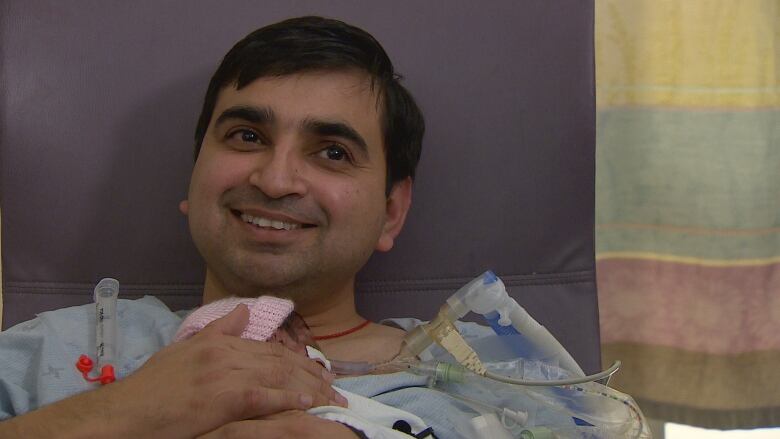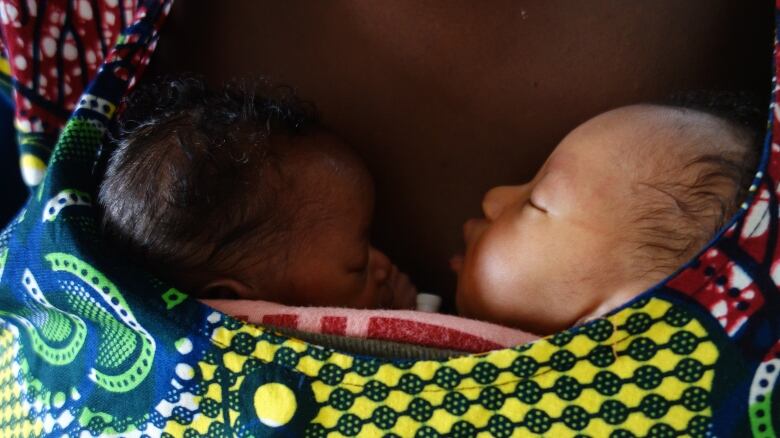Kangaroo care for preemies shows profound power of touch
It makes sense how mother or father's touch has profound effects lasting into adulthood, pediatrician says

Simply keeping tiny, preterm babies warm and nourished through skin-to-skin contact and breastfeeding offered considerable benefits over 20 years, researchers have found.
In Kangaroo Mother Care,a parent or caregiver becomes an infant's incubatorand main source of food and stimulation, through continuous skin-to-skin contact between the baby and adult. The infant nests directly on the upper abdomen soon after birth,with a timely discharge from hospitaland close followup.
Kangaroo care was originally developed in Colombia as an outpatient alternative to neonatal care units,where infants stay in an incubator while they gain weight.
- Need a snuggle? Vulnerable infants bond with volunteer cuddlers
- C-section newborns to bond skin-to-skin for study
Now, Dr. Nathalie Charpak in Bogota and her team have reviewed the records of participants from a 1993 to 1996 study to see whether the benefits of kangaroo care for 228 babies continued into young adulthood, compared with a control group of 213 babies who did not receive kangaroo care.
"What we found was first the benefit on mortality, it's clear," Charpak said in an interview. "Yes, really it's a protector for mortality.
"In the group of the lowest education of the mother, we found less [aggressiveness], less hyperactivity and less antisocial conduct behaviour in the kangaroo group."
The kangaroo-care parents also seemed to be more protective and nurturing.

"We showed that when the father is carrying the baby in Kangaroo Mother Care during the neonatal period, he was more present at one year," Charpak said. "He is more present at one year you have less separated family at 20 years after. It's sympathetic."
The researchers hope their findings will be applied to extend kangaroo care to the 18 million preterm and low-birth weight infants born worldwide each year who are candidates.
The long-term study, published Monday in the journal Pediatrics, confirms what the neonatal intensive care team (NICU) at Toronto's Sunnybrook Hospital has long believed about the benefits of kangaroo care for babies and families, said Dr. Paige Church, who'swith the NICU followup clinic.
"I think it's profound. I mean to be held by a human is what we all crave," Church said. "It makes sense to me that the power of a mother or a father's touch has profound effects that will last into adulthood."
'Makes the world a better place'
In her experience, Church said kangaroo careempowers parents with a baby in the artificial environment of the NICU to re-establish their relationship with the infant.
Church said she thinks the benefits of kangaroo care "cascade throughout life," by changing the parents and how the baby experiences the environment, such as accommodating the sounds and stresses in the hospital.
"The babies are calmer here. They're more regulated here. There are less desaturations where they have less instability, so that's protective to their brains," Church said.
Kangaroo care infants have also been shown to have better sleep states, which boosts the potential for growth and learning, as well as improvesbreast milk supply.
At Sunnybrook, Rohit Bhambi and his wife are using kangaroo care with their daughter, Prisha, who is 2weeks old. She was born at nearly 24 weeks gestation.
"It was like [an] out of the world experience," Bhambi recalled of the first time he held Prisha, when she was a week old. "Literally I had tears in my eyes holding her. Felt so good."
Bhambi said that when he holds Prisha on his chest, his tiredness goes away. The baby is also calmer, he said.
A journal commentary published with the study commended the researchers for courageously testing their method, first with an observational study and then a randomized controlled trial, to document the survival advantage to skeptics.
"[Kangaroo Mother Care] clearly makes the world a better place for babies and families," Dr. Lydia Furman of the pediatrics department at Case Western Reserve University School of Medicine in Cleveland wrote.
The research was funded by the government of Canada through Grand ChallengesCanada's Saving Brainsprogram, as well as Colombia's Administrative Department of Science, Technology and Innovation(COLCIENCIAS).
With files from CBC's Melanie Glanz












_(720p).jpg)


 OFFICIAL HD MUSIC VIDEO.jpg)
.jpg)



























































































